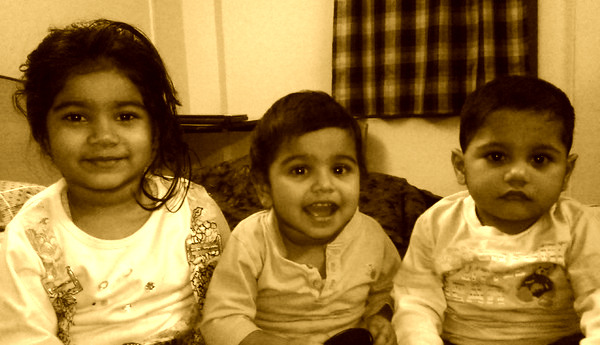What we find in Islam is truly a complete way of life. It covers everything, from religious rituals to spiritual advancement and from to marrying to child-raising. However we often tend to neglect these guidelines by referring to the changing of the times, the excess amount of fitnah that our children are constantly surrounded by and some go to the extent of claiming these guidelines are old fashioned.
We rather turn to modern day child-raising advisors, books and theories, than to the very thing that should define us as people, i.e. the deen (faith). The tools for bringing up children are all there (in the Quran, the Sunnah, and the examples of our pious predecessors), still adaptable in our day and age. But many of us act like poor workmen and blame the tools when the job “fails”, instead of our own lack of knowledge or attempt to apply it.
Mercy towards Children
So how was the Prophet (Sallallahu ‘Alayhi Wasallam) with children? Here’s a few hadiths, which we might all well know, to remind us:
The Prophet (Sallallahu ‘Alayhi Wasallam) said, “He is not of us who does not have mercy on young children, nor honor the elderly” (Al-Tirmidhi Hadith)
Allah’s Apostle kissed Al-Hasan bin Ali while Al-Aqra’ bin Habis At-Tamim was sitting beside him. Al-Aqra said, “I have ten children and I have never kissed anyone of them.” Allah’s Apostle cast a look at him and said, “Whoever is not merciful to others will not be treated mercifully.” (Sahih Al-Bukhari Hadith 8.26 Narrated by Abu Huraira RA)
The Apostle of Allah (Sallallahu ‘Alayhi Wasallam) came to some children who were playing: He greeted them lovingly. (Sunan of Abu-Dawood Hadith 5183 Narrated by Anas ibn Malik)
“I served the Prophet (Sallallahu ‘Alayhi Wasallam) for ten years, and he never said to me, “Uff” (a minor harsh word denoting impatience) and never blamed me by saying, “Why did you do so or why didn’t you do so?” (Sahih Al-Bukhari Hadith v8 #64 Narrated by Anas (when mentioning his childhood))
From this we can deduct, that in the sunnah we have been given clear instructions to treat our children with gentleness, mercy and compassion. We have heard stories of how Hassan and Husain (RA) would sometimes climb on the Prophets (pbuh) back, while he was praying, and he remained in his position until they moved away, we know he used to go to the houses of some of his companions and play with their children.
Mercy is the incredible gift of Allah Subhana Ta’ala that He bestows on parents, so that they would be able to take care, love and cherish their children. Nowadays many of us seem to have lost balance though, and we are either too strict or too lax in our attitudes. So did the Prophet (Sallallahu ‘Alayhi Wasallam) ever discipline children?
Discipline
The Prophet (Sallallahu ‘Alayhi Wasallam) never raised his own hand against a child (or a women, for that matter), and we should do our best to apply to this sunnah. There are some ahadtih that people unfortunately take out of the context ,misinterpret and then justify themselves, such as: Narrated Ibn ‘Abbaas that the Messenger of Allah (Sallallahu ‘Alayhi Wasallam) said: “Hang your whip where the members of the household can see it, for that will discipline them.”
However the hadith doesn’t advise us to use that whip, and the Prophet never told anyone to do such a thing in any other narration either. Islam is the religion of the middle path, and avoiding extremes. When are we, then, allowed to use physical discipline?
“There are various opinions of how to discipline one’s children. Some groups advocate physical forms of disciplinary action, while other groups completely oppose of it. The Islamic way is a middle ground between these two ideologies. Parents are only given permission to lightly smack their children in certain circumstances and with restrictive conditions. [Mawsu’a al-Difa’ ‘an al-Rasul]
Scholars note that it is permissible for parents to give their child a light smack if they’ve previously resorted to other methods of disciplinary action that proved unsuccessful. Or another example is if the child has reached the age of 10 years and refuses to pray, after the parents have attempted since the age of 7 to exhort and instruct the child to worship the Lord of the Worlds. [ibn Zayn, al-‘Uqubat al-Tarbawiyya al-Mufida]
If giving a child a light smack, one should know that
1. One cannot hit his face;
2. It cannot be a harsh or severe hitting;
3. It must be done with the intent to discipline the child, not out of anger; and
4. One cannot insult, degrade, or verbally abuse the child. Scholars concur that the best place to lightly smack a child is on the two hands or the two feet. [Mawsu’a al-Difa’ ‘an al-Rasul]”
Scholars have also pointed out, that if we beat our children for minor issues (for example a child breaks our favorite vase, paints on our best abaya, pours a pot of curry on the living room carpet, etc (provided of course, that these are accidents, or that the child is small), or even if we clearly get angry and start yelling for these kind of incidents, what effect can we expect beating or yelling to have on them, when they’re 10 and (Allah forbid) refuse to pray? It will have no effect, whatsoever, except a negative one, because this will lead the child to think, that, for example, breaking a vase and not praying are in the same category (which of course they’re not. Of course the situation is different, if the child does these kinds of things on purpose, or when they are, let’s say, older than 7).
Favoritism and Empty Promises
The Prophet (Sallallahu ‘Alayhi Wasallam) also strictly advised us against having favoritism amongst our children. We should make sure we treat our children equally, at all times. We should also never make empty promises of lie to our children. Here are some ahadith to illustrate this:
My mother called me once, whilst the Prophet (peace be upon him) was at our home and she said, “Come here, I will give you something.” Thereupon the Prophet (peace be upon him) asked, “What did you want to give to him?” She replied, “Dates.” The Prophet then said, “Had you not given him anything, it would have been recorded as a lie.” (Sunan of Abu Dawood Hadith Narrated by Ibn Aamir)
The Prophet (Sallallahu ‘Alayhi Wasallam) said: Act equally between your children; Act equally between your sons. (Sunan of Abu-Dawood Hadith 3537 Narrated byAn-Nu’man ibn Bashir)
I heard An-Nu’man bin Bashir on the pulpit saying, “My father gave me a gift but ‘Amra bint Rawaha (my mother) said that she would not agree to it unless he made Allah’s Apostle as a witness to it. So, my father went to Allah’s Apostle and said, ‘I have given a gift to my son from ‘Amra bint Rawaha, but she ordered me to make you as a witness to it, O Allah’s Apostle!’ Allah’s Apostle asked, ‘Have you given (the like of it) to everyone of your sons?’ He replied in the negative. Allah’s Apostle said, ‘Be afraid of Allah, and be just to your children.’ My father then returned and took back his gift.” (Sahih Al-Bukhari Hadith 3.760 Narrated by Amir)
You get what you give, inshaAllah
We should give these narrations the weight they deserve. We would all love our children to treat us the sunnah way, especially when we reach old age, wouldn’t we? But how can we expect this to happen, if we don’t ourselves raise them the sunnah way? At the end of the day, what all these modern child psychologists and super-nannies are saying is what already as Muslim parents we should know; to be loving, but firm. To be always be fair. To expect realistically. To communicate. And to know, that if we want our children’s behavior to change, if we want them to become good people, we must first become good people ourselves.
There is a sunnah to following the sunnah – we need to understand the spirit of the sunnah instead of just picking and choosing what is convenient for us to follow, or what makes us look religious. A good general guideline (for dealing with our children, as well as everyone else) would then be:
The Prophet (peace be upon him) said to me, “O A’isha, be gentle, for gentleness has never been used in anything without beautifying it; and it has never been removed from something without debasing it.” (Sunan of Abu Dawood Hadith Narrated by A’isha)
 navedz.com a muslim's Quest for the truth
navedz.com a muslim's Quest for the truth










Masha Allah an excellent piece of work…..
Also Check out: Do not cry over Spilt Milk